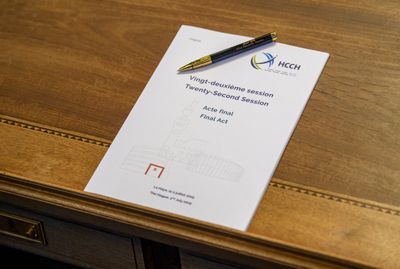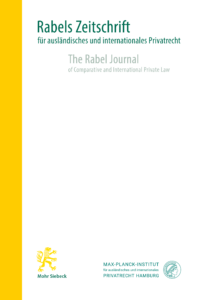Views
Judgments Convention – No Thanks?
On September 1st, 2023, the 2019 Hague Judgments Convention will enter into force for the Member States of the EU and Ukraine. According to the HCCH, the Convention is “a true gamechanger in international dispute resolution”, which will “reduce transactional and litigation costs, facilitate rule-based multilateral trade and investment, increase certainty and predictability” and “promote effective justice for all”. The international conference taking place in Bonn later this week will likely strike an equally celebratory tone.
This sentiment is not shared universally, though. In a scathing article just published in Zeitschrift für Europäisches Privatrecht (ZEuP) entitled ‘Judgments Convention: No Thanks!‘, Haimo Schack (University of Kiel) labels the Convention as “evidently worthless”.

Schack comes to this damning conclusion in three steps. First, he argues that the 2005 Choice of Court Convention, the first outcome of the decades-long HCCH Jurisdiction Project, has been of minimal use for the EU and only benefited Singapore and London. Read more
Towards an EU Regulation on the International Protection of Adults
On 31 May 2023, the European Commission presented a proposal for a Regulation on jurisdiction, applicable law, recognition and enforcement of measures and cooperation in matters relating to the protection of adults (in the following: EU Adult Protection Regulation – EUAPR). This proposal is a response to significant demographic and social changes in the EU: Many Member States face enormous challenges posed by an increasingly aging population. Due to considerable improvements in medical care in recent decades, people grow much older than they used to, and this lengthening of the average lifespan in turn leads to an increase in age-related illnesses such as Alzheimer’s disease. This demographic change creates problems for private international law, because the mobility of natural persons has increased within the EU where borders may, in principle, be crossed without restrictions. Many people who have left their state of origin in search for work elsewhere in their youth or middle age do not return to their home state after retirement, but rather spend the last part of their lives where they have established a new habitual residence. Besides, more and more people decide to leave their home state once they have reached the age of retirement. Such processes of migration at a late stage in life may have different reasons: Some old-age movers may want to avoid a heavy taxation of their estates that would put a burden on their heirs, some may wish to circumvent other restrictions of domestic inheritance laws (e.g. the right to a compulsory portion), others may simply wish to spend the remaining parts of their lives in milder climates, e.g. the Mediterranean, or look for a place to stay where the cost of living is lower, e.g. in some parts of Eastern Europe. When these persons begin to suffer from an impairment or an insufficiency of their personal faculties which no longer allows them to protect their interests themselves, however, intricate conflict of laws problems may arise: The authorities or courts of which state shall have jurisdiction to take protective measures concerning vulnerable adults or their property? Which law is to be applied to such measures? Under which conditions may protective measures taken in one state be recognised and enforced in other states?
The EUAPR is meant to solve these problems. Read more
Dubai Courts on the Recognition of Foreign Judgments: “Recognition” or “Enforcement”? – that’s the Problem!
“Recognition” and “enforcement” are fundamental concepts when dealing with the international circulation of foreign judgments. Although they are often used interchangeably, it is generally agreed that these two notions have different purposes and, ultimately, different procedures (depending on whether the principle of de plano recognition is accepted or not. See Béligh Elbalti, “Spontaneous Harmonization and the Liberalization of the Recognition and Enforcement of Foreign Judgments, Japanese Yearbook of Private International Law, Vol. 16, 2014, p. 269).
However, in legal systems where this fundamental distinction is not well established, the amalgamation of the two notions may give rise to unnecessary complications that are likely to jeopardize the legitimate rights of the parties. The following case, very recently decided by the Dubai Supreme Court, is nothing but one of many examples which show how misconceptions and confusion regarding the notion of “recognition” would lead to unpredictable results (cf. e.g., Béligh Elbalti, “Perspective of Arab Countries”, in M. Weller et al. (eds.), The 2019 HCCH Judgments Convention – Cornerstones, Prospects, Outlook (Hart, 2023) pp. 1983-184ff).
News
Out now: Issue 4/2024 of RabelsZ
 The last issue of RabelsZ 2024 has just been released. It contains the following contributions (which are all available Open Access: CC BY 4.0):
The last issue of RabelsZ 2024 has just been released. It contains the following contributions (which are all available Open Access: CC BY 4.0):
Holger Fleischer & Simon Horn, Unternehmensskandale und skandalgetriebene Regulierung: Die Stavisky-Affäre als Prüfstein (Corporate Scandals and Scandal-Driven Regulation: The Stavisky Affair as Touchstone), pp. 648–693, https://doi.org/10.1628/rabelsz-2024-0062 Read more
Extension of deadline (to 10 January 2025) for Call for Papers for Special Issue of the Journal of Sustainable Development and Policy on the theme, “Private International Law and Sustainable Development in Africa”
Edited by:
Dr Chukwuma Okoli, University of Birmingham, United Kingdom
Dr Eghosa O. Ekhator, University of Derby, United Kingdom
Professor Veronica Ruiz Abou-Nigm, University of Edinburgh, United Kingdom
Professor Ralf Michaels, Max Planck Institute for Comparative and International Private Law, Germany
OVERVIEW
The Journal of Sustainable Development Law and Policy invites scholarly articles for publication in a special issue focusing on the theme “Private International Law and Sustainable Development in Africa.” This is an area with limited scholarship in Africa, as most research has traditionally emphasized substantive laws, often neglecting the critical role of private international law in sustainable development. Interested researchers should consider themes such as the ones explored in Michaels/Ruiz Abou-Nigm/Van Loon (eds.) (2021): The Private Side of Transforming our World – UN Sustainable Development Goals 2030 and the Role of Private International Law. Proposals should emphasise private international law and sustainable development issues that are of particular relevance to the African context. Read more
[Now available] Chronology of Practice: Chinese Practice in Private International Law in 2023 By Prof. HE Qisheng
 Since its inception in 2001, the annual survey on Chinese judicial practice in private international law, published by the Chinese Journal of International Law, has served as a valuable source of information on Chinese practice in private international law, particularly during periods when case law was not readily available (notably prior to 2013). The first annual survery, titled ‘Private International Law in the Chinese Judicial Practice in 2001’, appeared in Vol. 2(1), 2003, and was prepared by Professors Huang Jin and Du Huangfang. However, in its early years, the survey was not published on a regular basis. Indeed, in addition to the 2001 survey, only three others were published between 2005 and 2014: the survey for the year 2002 (published in 2005), for 2003 (published in 2008), and for 2006 (published in 2009).
Since its inception in 2001, the annual survey on Chinese judicial practice in private international law, published by the Chinese Journal of International Law, has served as a valuable source of information on Chinese practice in private international law, particularly during periods when case law was not readily available (notably prior to 2013). The first annual survery, titled ‘Private International Law in the Chinese Judicial Practice in 2001’, appeared in Vol. 2(1), 2003, and was prepared by Professors Huang Jin and Du Huangfang. However, in its early years, the survey was not published on a regular basis. Indeed, in addition to the 2001 survey, only three others were published between 2005 and 2014: the survey for the year 2002 (published in 2005), for 2003 (published in 2008), and for 2006 (published in 2009).
Since 2015, the regular publication of the survey has been ensured by Professor He Qisheng of Peking University Law School under the title “Chronology of Practice: Chinese Practice in Private International Law”. (For previous announcements on this blog, see the posts for 2018, 2019, 2020, and 2021. Annual surveys for the years 2013 to 2018 are also available on Professor He’s SSRN page.) Professor He’s dedication to maintaining and expanding the annual survey has been instrumental in ensuring it remains an indispensable resource for the field, while making information on private international law in China readily accessible to non-Sinophone researchers. Read more


